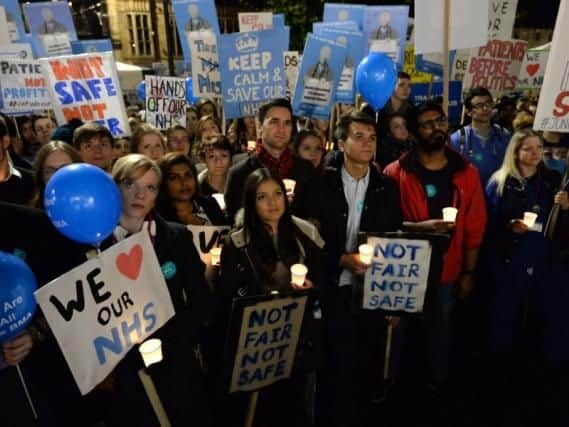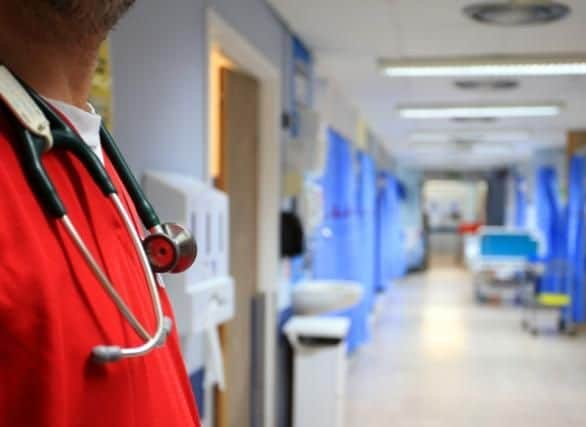Yorkshire hospitals step up plans for unprecedented strike after 98 per cent of junior doctors vote for walk out


Clinicians across the region and nationally are taking in the news today that, following a ballot of more than 37,000 junior doctors in England, more than 99 per cent of those who responded have voted in favour of industrial action short of a strike and 98 per cent voted for full strike action.
More than 28,000 trainees used the British Medical Association (BMA) ballot to voice their displeasure at Health Secretary Jeremy Hunt's plans to impose a controversial new contract on them by August 2016.
Advertisement
Hide AdAdvertisement
Hide AdFollowing a high profile protest in Leeds city centre attended by 3,000 juniors and other health workers and a number of #MeetTheDoctors engagement events regionally, doctors in some of the 6,000 posts below consultant level in Yorkshire look set to stage a walk out.
The action would mean would include a 24-hour period of emergency care only on December 1 from 8am and full nine-hour strikes from 8am on December 8 and 16.
Dr Phil Atkinson, a West Yorkshire junior doctor working in anaesthetics who helped to organise the Leeds protest, explained that he is "truly saddened" that the dispute has come to this.
He said: "Doctors see this new contract as a threat to their patients, their profession and the future of the NHS.
Advertisement
Hide AdAdvertisement
Hide Ad"This is reflected in the overwhelming ballot results in favour of industrial action. In order to protect patients the BMA gave advanced notice of potential strike dates so that hospitals could put in place contingency plans."


He said, after around 360 Leeds consultants showed their support for junior colleagues in a letter to Mr Hunt, many in the region have expressed that they "will be able to provide safe emergency cover" should the industrial action go ahead although there will "inevitably" be significant disruption to elective services.
Nevertheless young doctors are hopeful that the strike can be avoided after the BMA announced it has approached ACAS to offer conciliatory talks with Mr Hunt and NHS Employers.
Dr Atkinson, who lives in Bramhope, Leeds, added: "I sincerely hope the Government will now re-enter talks without preconditions or the threat of imposition and that we can all move forward to create a contract that will protect patients, doctors and the NHS."
Advertisement
Hide AdAdvertisement
Hide AdDr Mark Porter, BMA council chair, said: "Junior doctors have today made their views perfectly clear but that it is still possible to get back around the negotiating table to deliver a contract that is safe for patients."
Hospital trusts across the country were informed of the dates that potential strike action would take place last Thursday, and today's ballot result has led NHS organisations including the region's biggest acute trust, Leeds Teaching Hospitals NHS Trust (LTH), to step up their contingency plans.
Dr Yvette Oade, chief medical officer at LTH, said: "We are currently working with senior clinical leaders in developing and refining our planning, to ensure all our inpatients as well as emergency and urgent admissions are looked after safely and appropriately during any industrial action."
The BMA has been in discussion with the Government over junior contract reforms for three years but talks broke down earlier this year. The doctors' union argued the proposed changes scrap safeguards to prevent them working excessive hours and don't "properly recognise" working unsocial hours.The changes would also see Monday to Friday, from 7am to 10pm, and Saturday, from 7am to 7pm, deemed normal working hours whereas any work done outside 7am to 7pm Monday to Friday is currently paid at a higher rate.
Advertisement
Hide AdAdvertisement
Hide AdDespite Mr Hunt's last-ditch pay offer, which included an 11 per cent basic pay rise, earlier this month the BMA insists that the changes could see juniors working longer hours eventually for less pay after pay protection elements expire.
Urging junior doctors to reconsider their decision, Mr Hunt said: “It is regrettable that junior doctors have voted for industrial action which will put patients at risk and see operations cancelled or delayed. We want to ensure that patients have the same quality of care across the week, and have put forward a generous offer that increases basic pay by 11 per cent and reduces doctors’ hours."
England's chief medical officer, Professor Dame Sally Davies, added: "I recognise the strong feeling of junior doctors and will always support them as the future of the NHS, but the severity of the action the BMA proposes is a step too far."